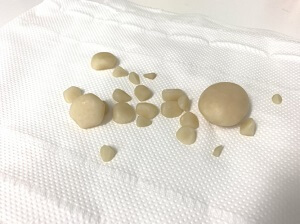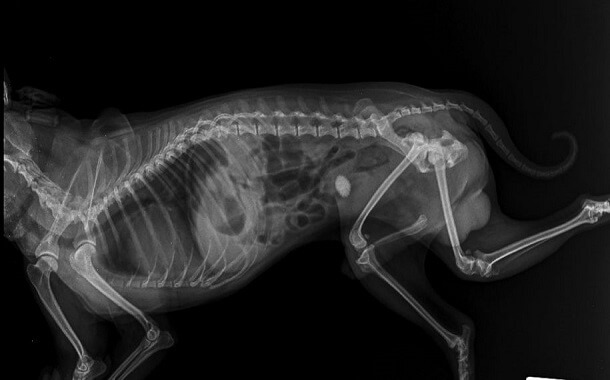How Much Does Dog Bladder Stones Surgery Cost?
Bladder stones, or uroliths, as they are technically called, are hard, stone-like elements that form in a dog’s bladder. These stones can be made up of various minerals, form a variety of shapes, and can be associated with bacteria, crystals, and mud.
There may be one or more bladder stones in a dog’s bladder and they may grow very large or remain very small. They are different from kidney stones because they form inside the bladder and not in a dog’s kidney.
How Much Does Dog Bladder Stones Surgery Cost?
Dog bladder stones surgery costs anywhere between $750 and $1,850. These prices will most likely depend on the needed procedure/treatment, the expertise of the veterinarian, the size of your dog, and of course, your geographical location.
In case your dog has all the diagnosis tests performed and is positive for bladder stones here are the possible treatment choices and how much they cost:
There are multiple types of bladder stones. Dietary changes and medications to dissolve bladder stones may be recommended by your veterinarian, depending on the type of stone present in your dog’s bladder.
Struvite stones are the most common type of stone that can be dissolved by feeding the pet a special diet. You will pay an average of $40 per 8-pound bag of special diet food and $5 for 30 Amoxicillin tablets.
Surgery for removing stones is the most commonly used treatment for bladder stones that cannot be dissolved and can cost between $750 and $1,850 in total. In some cases, ultrasound separation of stones is an option. It is available in specialized veterinary hospitals as the dog must be under anesthesia. Once separated into small enough pieces, the stones can then be washed by opening the urinary tract.
You can also wash very small bladder stones with saline solution. Some stones are small enough to get flushed through the opening of the urinary tract without having to separate them with ultrasound. The veterinarian can remove them from the bladder just by using a urethral catheter and sterile saline solution, while the dog is under sedation. This procedure can cost from $410 to $870. It won’t work if the dog also has a urinary tract infection.
Laser lithotripsy is another type of procedure, but it’s not too common and can cost between $1,100 to $1,600. In this case, the stones are diminished with a laser to be passed naturally. The procedure has a faster recovery time and is less evasive.
| Treatment Method | Cost |
|---|---|
| Dissolving Stones with Diet and Medication (Special diet) | $40 per 8-pound bag |
| Dissolving Stones with Diet and Medication (Amoxicillin tablets) | $5 for 30 tablets |
| Surgery for Removing Stones | $750 to $1,850 |
| Ultrasound Separation of Stones | $410 to $870 |
| Laser Lithotripsy | $1,100 to $1,600 |
The above treatment prices will not include the costs to get a diagnosis.
According to Melbourne Pet Surgery, the cost for a bladder stone removal surgery is anywhere from $1,500 to $2,000, without the diagnosis costs.
How are bladder stones diagnosed in dogs?
 X-rays are often used as a diagnostic tool that veterinarians use to confirm whether a dog has bladder stones and can cost from $55 to $220, depending on the number of shoots taken. Because bladder stones are elements that contain minerals, they often reflect X-rays and appear as white objects in the dog’s bladder.
X-rays are often used as a diagnostic tool that veterinarians use to confirm whether a dog has bladder stones and can cost from $55 to $220, depending on the number of shoots taken. Because bladder stones are elements that contain minerals, they often reflect X-rays and appear as white objects in the dog’s bladder.
A small percentage of bladder stones, such as urate stones or any stone that is tiny, do not reflect X-rays well and appear best on an ultrasound that can cost you $270 to $550.
The veterinarian may also suspect that the quadruped has or is at risk of stones based on the presence of deposits (calcium-struvite or oxalate crystals, for example) in a fresh urine sample. These crystals can be seen when urine is analyzed under a microscope during a urine test. The dog urinalysis costs from $70 to $190 depending on the age and how many lbs. your dog has.
The price you get to pay just for the diagnosis can be anywhere from $390 up to $910 and more. If your dog is older than 7 years, bloodwork will be needed before the surgery to remove the stones and will cost around $100. Some dogs might also need a blood transfusion during surgery, which will cost around $120 to $300.
The extra costs related to treatment or cystotomy surgery
No matter the treatment regimen, you’ll still have to take your dog to the vet for some visits. These visits will also include urinalysis to see the evolution, and this will cost you another $70 to $190.
There are also cases when your dog will need prescription-based dog food for life, which will cost you some extra bucks in the long run.
There are veterinarians that may charge you extra for the anesthesia and will not have it included in the surgery’s final cost.
The symptoms of bladder stones in dogs
When a dog has problems with urination, they often show signs and symptoms of discomfort and problems while urinating.
Frequent urination or urination in the house can also be seen in dogs with bladder stones due to the pain or discomfort they feel.
Even if their bladders are not full, dogs may feel that they need to urinate. In rare cases, dogs may become completely unable to urinate, which is a life-threatening emergency.
One of the most obvious signs that a dog has bladder stones is blood in the urine, but other health problems can cause this symptom as well. When the stones irritate the bladder wall, the blood is released into the urine.
Sometimes blood clots are seen, but other times the urine is pink or red due to the presence of red blood cells. If there is snow on the ground where the dog urinates, this symptom will be much more visible.
How to prevent bladder stones in dogs and cats
If you have a dog that has an increased risk for bladder stones, your veterinarian may recommend that you feed them a special diet, which is meant to reduce the development of the stone.
They will also recommend increasing fluid intake to encourage regular urination and decreased urine levels.
Finally, if a dog has a history of bladder stones related to a genetic abnormality, that dog should not be used for breeding purposes.


Leave a Reply
Want to join the discussion?Feel free to contribute!